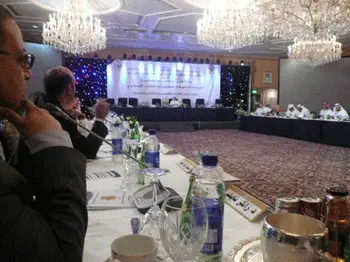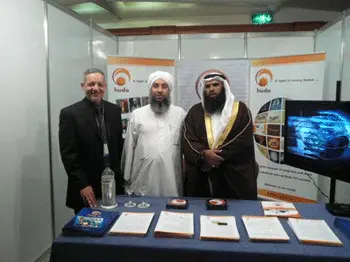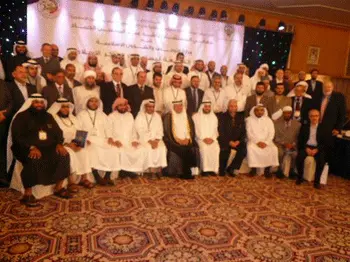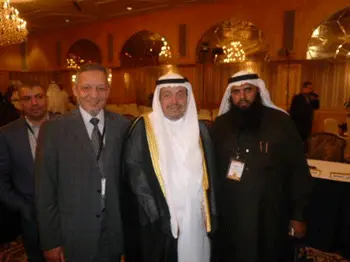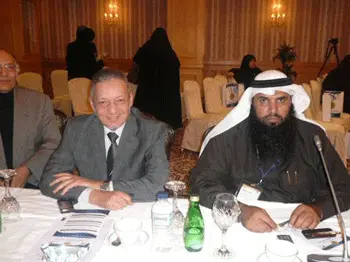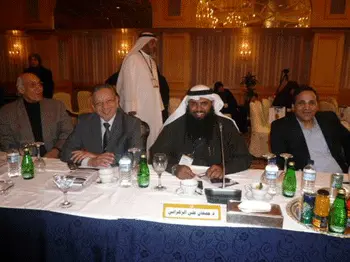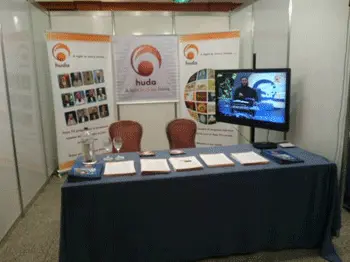At 9:00 AM, Monday the 7th of March 2011 in Kuwait Sheraton Hotel, the Ministry of Awqaaf and Religious Affairs inaugurated its ninth symposium on the new novelties of Islamic intellect under the title: “Value-based Mass communication Between Theory and Practice”
This symposium was attended from Huda TV’s side by Dr. Hammad Alghamas- chairman, Mr. Jamaan Alzahrani- G.M. and Mr. Ahmed Fahmy – Regional Director.
In his speech to the conference, his Excellency, Mr. Rashed Abdulmohsen Al-Hammad, Prime Minister’s Deputy for Legal Affairs, Minister of Justice, and Minister of Awqaaf and Religious Affairs confirmed that Mass Media became a special discipline of knowledge that has its own components, institutions, conditions, techniques and specialists. He indicated that it has its fruits that are being produced by other disciplines of knowledge as a heavy industry that has its own plans and institutions.
Al-Hammad pointed out that mass media is not a mere entertainment as it was in the past. Rather, it became an essential part in our community that uses entertainment in order to deliver the message of truth and shape people’s minds.
He also added that Early Muslims utilized all of their available potentials for mass communication. In order to convey their voice, they would choose high place from which they delivered speeches, sermons and call for prayer.
Al-Hammad concluded his speech by asking rhetorical question: If Muslims have succeeded in delivering their message in the best way which would make it manifest to all; and if we could frame an understanding of the value-based media, have we succeeded to transfer this massive media openness in order to use it for good purposes?
In his speech, Dr. Adel Al-Fallah first undersecretary of the Ministry of Awqaf, stated that what we refer to as “value-based media” may be limited to the Islamic Da’wah (call to Islam) since it is a means of spreading Islam. “Mass communication is the essence of many acts of worship such as the call for prayer, Friday sermon, pilgrimage, etc.” said he.
Dr. Adel Al-Maajid confirmed the leadership and the depth of Kuwaiti experiment in the Arabic environment. He gave plenty of examples that aim at enrooting high morals in the society such as “Iftah ya Simsim“
Value-based Satellite channels: History of Experiment and Future Perspectives
The first session was chaired by Motleq Alaqraoi, Assistant Undersecretary of the Kuwaiti Ministry of Awqaf, who pointed out that the recent political events witnessed in the region embodied a set of values that rarely occur at advanced level. He also stated that the value-based institutions did not take the most advantage of the recent political events.
On the other hand, Mr. Khalid Al-Qahs stated that we should not limit the value-based mass media to the religious media. He counted five criteria of assessing religious TV channels: Professionalism, Management, Financing, Content, and Audience Scurvies. He also stated that we need well-trained administrations that are aware of the missions of media.
As for practical experiment, Sheikh Hammad Al-Ghammas spoke about Al-Majd TV Channels showing that their objectives are quite clear from the very beginning. It is a bouquet of Islamic-oriented flexible and modern channels. He called for a joint project targeting non-Arabic speakers in order to put the idea of the Conference into practice. He also indicated that he is ready to give 50 % fund to a joint value-based media project through Al-Majd channels and their affiliates.
Mr. Hashim Al-Kafween narrated the story of the development of Al-Risalah TV stating that religious Channels can never be run by the mentality of individual initiatives pointing out that Al-Rislah has a special department whose job is to assist the produced programs technically and intellectually.
As for Muhammad Salam presentation, he stated that one of the most distinguished features of Iqraa TV Channels is that they were able to solve the funding problem through endowments. He also said that the Iqraa future projects will include broadcasting in seven languages.
In the final session, the participants proposed the necessity of formulating a value-based system upon which electronic and satellite mass media should act. This will support the values of the social and civilizational development. At the end of the session, the participants expressed their gratitude to his Royal Highness, Sheikh Sabbaah Al-Ahmad the Prince of the country, and his Royal Highness Sheikh Nawwaf Al-Ahamd, the Crown Prince, for hosting the symposium. They considered it as media demonstration to be added to the Kuwait record which is full of endeavors that support Islamic activities.
The participants also highlighted that the value-based media is in need for a code of ethics that constitutes a reference to the media work. They also called for putting an agenda on the common topics that handle issues related to Muslims in order to unite the vision and thought of the Muslim communities. In addition, they confirmed that the need to expand the audience participation in the production of the content under supervision of media personnel. They also called for new techniques in order to activate real partnership with the audience in general and youth in particular through many studies on the case.
Finally, the participants urged for increasing the number of languages used in the value-based media in order to address non-Arabic speakers. These languages shall include Urdu, Spanish, French, Portuguese, Hausa, Swahili, Russian and Chinese.
Mr. Ahmed Fahmy and Mr. Jamaan Alzahrani in a picture with Dr. Adel Al-Fallah first undersecretary of the Kuwaiti Ministry of Awqaf Awqaaf and Religious Affairs

